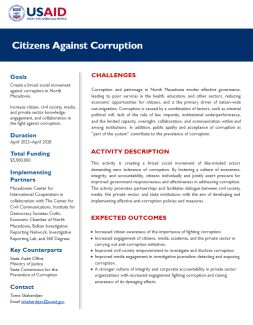CHALLENGES
Corruption and patronage in North Macedonia erodes effective governance, leading to poor services in the health, education, and other sectors, reducing economic opportunities for citizens, and is the primary driver of nation-wide out-migration. Corruption is caused by a combination of factors, such as minimal political will, lack of the rule of law, impunity, institutional underperformance, and the limited capacity, oversight, collaboration, and communication within and among institutions. In addition, public apathy and acceptance of corruption as “part of the system” contribute to the prevalence of corruption.
ACTIVITY DESCRIPTION
This activity is creating a broad social movement of like-minded actors demanding zero tolerance of corruption. By fostering a culture of awareness, integrity, and accountability, citizens individually and jointly exert pressure for improved government responsiveness and effectiveness in addressing corruption. The activity promotes partnerships and facilitates dialogue between civil society, media, the private sector, and state institutions with the aim of developing and implementing effective anti-corruption policies and measures.
EXPECTED OUTCOME
- Increased citizen awareness of the importance of fighting corruption.
- Increased engagement of citizens, media, academia, and the private sector in carrying out anti-corruption initiatives.
- Improved civil society empowerment to investigate and disclose corruption.
- Improved media engagement in investigative journalism detecting and exposing corruption.
- A stronger culture of integrity and corporate accountability in private sector organizations with increased engagement fighting corruption and raising awareness of its damaging effects.

